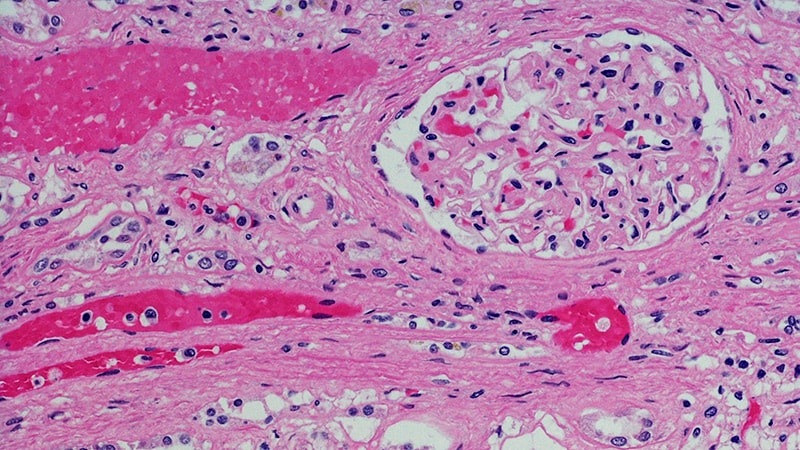[ad_1]
TOPLINE:
A personalized cancer vaccine targeting neoantigens in high-risk renal cell carcinoma (RCC) demonstrates promising results, with no disease recurrence in any of the nine participants over a 40.2-month median follow-up period. The vaccine generated immune responses against cancer driver mutations in all patients, with seven out of nine showing T-cell reactivity against autologous tumors.
METHODOLOGY:
- Previous studies in melanoma showed promising results with personalized cancer vaccines, but implementation in low mutation burden tumors like RCC faces challenges in manufacturing and generating immune responses.
- Researchers conducted a phase 1 trial (ClinicalTrials.gov identifier NCT02950766) at Dana-Farber Harvard Cancer Center, Boston, to evaluate a neoantigen-targeting personalized cancer vaccine in patients with high-risk, fully resected clear cell RCC with or without ipilimumab.
- A total of nine participants with stage III/IV clear cell RCC who underwent curative intent surgery were enrolled between March 2019 and September 2021, with five patients receiving vaccine plus ipilimumab and four receiving vaccine alone.
- Each participant received four pools of up to five synthetic long peptides targeting neoantigens (300 μg per peptide) mixed with 0.5 mg poly-ICLC per pool, administered both subcutaneously and intradermally at weeks 1, 4, 8, 12, 16, 20, and 24.
- Participants were followed for a median of 40.2 months after surgery, with regular imaging every 8 weeks up to 24 weeks, then every 12 weeks during follow-up period up to 2 years.
TAKEAWAY:
- At a median follow-up of 40.2 months after surgery, none of the nine study participants experienced recurrence of renal cell carcinoma, and no dose-limiting toxicities were observed.
- All patients generated T-cell immune responses against the personalized cancer vaccine antigens, including responses to renal cell carcinoma driver mutations in VHL, PBRM1, BAP1, KDMSC, and PIK3CA genes.
- Following vaccination, researchers observed a durable expansion of peripheral T cell clones, with T cell reactivity against autologous tumors detected in seven out of nine patients.
- The personalized cancer vaccines demonstrated high immunogenicity, successfully targeted key driver mutations, and induced antitumor immunity in high-risk renal cell carcinoma patients.
IN PRACTICE:
“The favorable toxicity profile of [personalized cancer vaccines] highlights the potential beneficial role for these neoantigen-targeting vaccines in RCC, either as monotherapy or in combination with immune checkpoint inhibition. Furthermore, the immunological efficacy and encouraging clinical outcomes in this tumor type with a low mutational burden support the broader investigation of PCVs as adjuvant therapies for solid tumors,” wrote the authors of the study.
SOURCE:
The study was led by David A. Braun, Yale School of Medicine in New Haven, Connecticut, and Toni K. Choueiri, Dana-Farber Cancer Institute in Boston. It was published online in Nature.
LIMITATIONS:
According to the authors, while initial immunological activity and clinical results are encouraging, larger-scale randomized trials will be needed to confirm these findings and fully understand the potential clinical efficacy. The study was limited to patients with clear cell subtype, excluding approximately 25% of kidney cancer patients who have variant histology tumors. The researchers note that the addition of subcutaneous ipilimumab did not substantially change the magnitude or phenotype of the peripheral immune response in the immediate postvaccination period, though this result should be interpreted with caution due to the small sample size and lower total administered dose than conventional systemic doses.
DISCLOSURES:
The study received support from the Gateway for Cancer Research and the Department of Defense CDMRP Kidney Cancer Research Program. Bristol Myers Squibb provided ipilimumab but no funding support for the clinical trial. Braun disclosed receiving support from the Department of Defense Early Career Investigator grant, the Louis Goodman and Alfred Gilman Yale Scholar Fund, and the NIH/NCI. Bradley A. McGregor reported consulting fees from multiple pharmaceutical companies including Arcus, Aveo, Bristol Myers Squibb, Daiichi Sanko, Eisai, Exelixis, Genmab, Gilead, Hexagen, Pfizer, and SeaGen. Additional disclosures are noted in the original article.
This article was created using several editorial tools, including AI, as part of the process. Human editors reviewed this content before publication.
[ad_2]
Source link : https://www.medscape.com/viewarticle/personalized-neoantigen-vaccine-shows-promise-high-risk-2025a10002z5?src=rss
Author :
Publish date : 2025-02-06 11:03:49
Copyright for syndicated content belongs to the linked Source.
